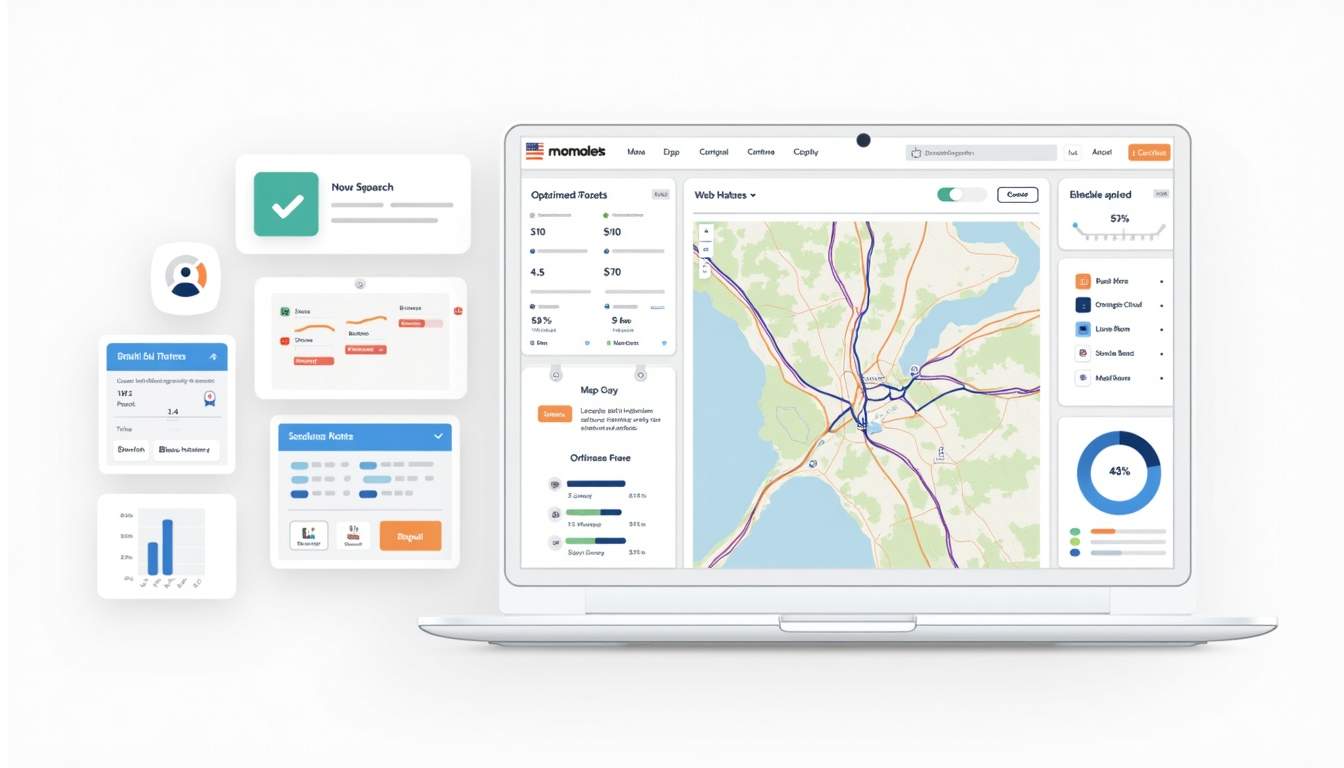In today’s fast-paced world, the ability to efficiently schedule home services can make or break a business. Whether you’re managing an HVAC team, a landscaping company, or any service-based business, effective scheduling not only streamlines operations but also enhances customer satisfaction. This article explores the importance of efficient scheduling, key elements that contribute to an effective schedule, as well as tools and practical tips you can employ to elevate your scheduling practices.
Understanding the Importance of Efficient Scheduling
The Role of Scheduling in Home Services
Scheduling serves as the backbone of home service businesses. It determines when and how services are rendered, balances workload among employees, and ensures that customer requests are addressed promptly. From the initial client contact to the final service delivery, scheduling impacts every aspect of the customer experience.

An effective scheduling system not only helps you manage time more effectively but also improves resource allocation, reduces downtime, and enhances team productivity. It is crucial for businesses to understand that scheduling is not merely a background function but a vital process that drives success. For instance, a well-organized schedule allows businesses to anticipate peak times and allocate resources accordingly, ensuring that they are fully equipped to meet demand. This proactive approach can lead to a more streamlined operation and a significant reduction in last-minute cancellations or rescheduling, which can frustrate both customers and employees alike.
Benefits of Efficient Scheduling
Efficient scheduling brings numerous benefits, both for service providers and customers. Here are some key advantages:
- Increased Revenue: By maximizing the number of jobs completed in a day, businesses can increase their revenue significantly.
- Customer Satisfaction: Prompt and reliable service leads to happy customers, which in turn results in repeat business and referrals.
- Employee Satisfaction: A balanced workload fosters a positive working environment, keeps employees motivated, and minimizes burnout.
- Improved Communication: A well-structured scheduling system enhances communication between staff and clients.
Moreover, efficient scheduling can also lead to better data collection and analysis. By tracking service requests and employee performance over time, businesses can identify trends and make informed decisions about future staffing needs and service offerings. This analytical approach not only helps in fine-tuning the scheduling process but also aids in strategic planning, allowing businesses to adapt to changing market demands. Additionally, with the advent of technology, many scheduling systems now integrate with customer relationship management (CRM) tools, providing a seamless flow of information that enhances both operational efficiency and customer engagement.
Another significant advantage of efficient scheduling is its impact on service quality. When appointments are scheduled thoughtfully, technicians can arrive on time, fully prepared with the necessary tools and materials. This preparedness not only boosts the confidence of the service team but also reinforces the trust customers place in the business. When customers see that their time is valued and that their service providers are organized and punctual, it fosters a sense of loyalty and encourages them to recommend the service to others. In an industry where word-of-mouth can be a powerful marketing tool, maintaining a reputation for reliability through effective scheduling can be a game-changer.
Key Elements of an Efficient Schedule
Prioritizing Tasks for Maximum Efficiency
To create an efficient schedule, prioritizing tasks is essential. Not all appointments hold equal significance; understanding which tasks are most urgent and important can lead to better allocation of resources. Developing a system that categorizes tasks can further help in decision-making.
For example, emergency repairs should naturally take precedence over routine maintenance. By assessing client needs and the urgency of tasks, you can ensure that your team focuses on what matters most, thereby enhancing overall efficiency. This prioritization can also be aided by regular team meetings where members can voice their input on task urgency, allowing for a more collaborative approach to scheduling. Additionally, utilizing project management tools can help visualize task importance and deadlines, ensuring that everyone is on the same page.
Time Management Techniques in Scheduling
Incorporating time management techniques can lead to a more structured schedule. Techniques such as the Eisenhower Matrix, Pomodoro Technique, or time blocking can help you manage time effectively. Utilize these methods to create a visual representation of tasks and time allocation, aiding in balancing workloads and deadlines.
By establishing clear benchmarks for each task, you and your team can maintain focus throughout the day, leading to heightened productivity and reduced stress. Moreover, integrating breaks into your schedule using the Pomodoro Technique can prevent burnout and enhance creativity. Regular intervals of rest allow the mind to recharge, which can lead to more innovative solutions and improved problem-solving capabilities. By fostering a culture that values time management and well-being, you can create a more motivated and efficient team, ready to tackle even the most challenging projects.
Tools and Technologies for Home Services Scheduling
Digital Solutions for Scheduling
The emergence of technology has revolutionized the way we schedule home services. Digital scheduling tools provide seamless solutions that automate the scheduling process, allowing for easy rescheduling, monitoring of jobs, and client management. Platforms such as service management software can significantly reduce administrative burdens, enabling a focus on core business activities.
Moreover, mobile applications allow technicians to receive updates on their schedules in real-time, ensuring they can adapt to changes quickly while remaining in touch with the office. This connectivity not only enhances efficiency but also fosters a sense of teamwork, as technicians can communicate updates or issues directly with their supervisors, leading to improved service delivery and customer satisfaction.
In addition to real-time updates, many digital scheduling tools come equipped with features that allow for customer self-service. Clients can access their appointments online, make changes, or even book new services without needing to call the office. This not only empowers customers but also reduces the volume of calls that staff need to handle, allowing them to focus on more complex inquiries and enhancing overall service quality.
Automating Your Scheduling Process
Automation represents a game-changer in the scheduling realm. By utilizing advanced scheduling systems, businesses can minimize manual errors and free up valuable time that can be redirected toward enhancing service quality.
Automated reminders for both clients and staff reduce no-shows and ensure everyone is on the same page. Additionally, integrating scheduling tools with other systems, such as billing or customer relationship management platforms, can streamline communication and enhance operational efficiencies. This integration allows for a holistic view of customer interactions, enabling service providers to tailor their offerings based on previous engagements and preferences.
Furthermore, the use of analytics within these automated systems can provide valuable insights into scheduling patterns and customer behaviors. By analyzing this data, businesses can optimize their service offerings, adjust staffing levels based on peak demand times, and even identify potential areas for expansion. This data-driven approach not only enhances operational efficiency but also positions companies to better meet the evolving needs of their customers, ensuring they remain competitive in a rapidly changing market.
Tips for Creating an Efficient Schedule
Balancing Client Needs and Business Goals
When designing a scheduling system, it is vital to have a balanced approach that meets both client needs and business goals. Understanding customer preferences and availability can help in tailoring your services, leading to more satisfied clients. This could involve utilizing customer relationship management (CRM) tools that track client interactions and preferences, allowing you to anticipate their needs better and provide personalized service. Additionally, gathering feedback through surveys can offer insights into how clients perceive your scheduling efficiency and where improvements can be made.

However, ensure that your scheduling also aligns with your operational goals, such as maximizing workflow and minimizing overtime. Regularly revisiting your scheduling criteria will help you stay aligned with both customer satisfaction and business objectives. Consider implementing performance metrics that measure both client satisfaction and employee productivity. This dual approach not only helps in identifying areas of improvement but also fosters a culture of continuous enhancement within your team. By striking the right balance, you can create a scheduling system that not only meets the demands of your clients but also supports your business's growth and sustainability.
Dealing with Unexpected Changes in Schedules
No matter how well you plan, unexpected changes are bound to occur. Handling these changes with finesse is critical. Implementing a flexible scheduling system that allows last-minute adjustments can turn potential obstacles into opportunities. For instance, using digital scheduling tools that offer real-time updates can help you quickly adapt to changes, such as cancellations or rescheduling requests. This not only minimizes downtime but also enhances your reputation for reliability and responsiveness.
Having a backup plan for urgent appointments can improve response times. Moreover, keeping open lines of communication with your team can facilitate smoother transitions during schedule changes, ensuring that all team members are kept informed and can adjust accordingly. Regular team meetings to discuss scheduling challenges and solutions can foster a proactive mindset, encouraging team members to share their insights and strategies for managing unexpected changes. This collaborative approach not only strengthens team dynamics but also enhances overall operational efficiency, making your scheduling system more resilient to unforeseen disruptions.
Maintaining and Improving Your Scheduling System
Regular Evaluation of Scheduling Efficiency
To ensure ongoing success, it is necessary to evaluate your scheduling system regularly. Tracking key performance indicators such as on-time arrivals, job completion rates, and customer feedback can provide insight into areas that require improvement.

Use this data to identify patterns and trends, allowing for targeted adjustments to enhance operational efficiency. Regular evaluations empower your business to adapt and grow in response to an ever-changing landscape.
Continuous Improvement in Home Services Scheduling
Finally, embrace a culture of continuous improvement. Stay updated with the latest scheduling trends and technologies to remain competitive in the home services industry. Training sessions can bolster team skills, while customer feedback can offer invaluable perspectives for refining your processes.
By promoting an atmosphere of learning and adaptation, your scheduling system can evolve to meet the needs of both your business and your clients, positioning you for sustained success in the field.
In conclusion, effective scheduling is crucial for the success of home services. By understanding its importance, implementing essential scheduling techniques, and leveraging technology, you can cultivate a highly efficient scheduling system that enhances both customer satisfaction and business growth.
Ready to elevate your pool service business to the next level? ProValet is here to streamline your operations and enhance your customer interactions with our cutting-edge scheduling and management software. Designed specifically for medium to large pool service companies, ProValet respects the unique nature of your business while driving efficiency and revenue growth. Experience the power of automated scheduling, dispatching, invoicing, and direct customer communication through our integrated Homeowner app. Transitioning to ProValet is effortless, with our team guiding you every step of the way. Plus, with over 70% of invoices paid within a week, you'll see immediate financial benefits. Don't miss out on the opportunity to transform your business with ProValet. Schedule your 15 minute Discussion & Demo today and take the first step towards unmatched operational success.








